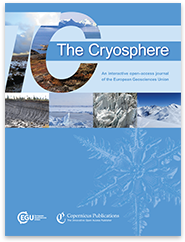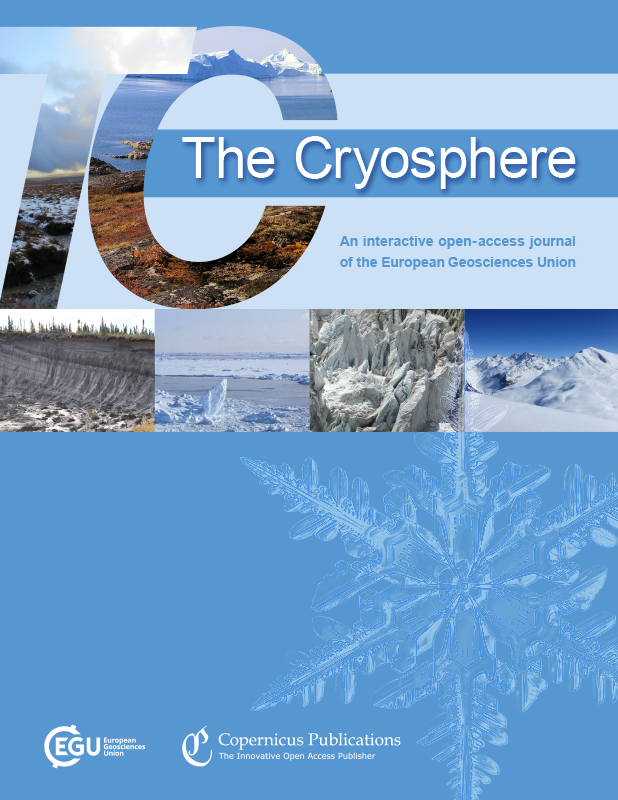Co-editors-in-chief: Chris Derksen, Christian Haas, Christian Hauck, Nanna Bjørnholt Karlsson & Thomas Mölg
eISSN: TC 1994-0424, TCD 1994-0440
The Cryosphere (TC) is a not-for-profit international scientific journal dedicated to the publication and discussion of research articles, short communications, and review papers on all aspects of frozen water and frozen ground on Earth and on other planetary bodies.
The main subject areas are ice sheets and glaciers, permafrost, river and lake ice, seasonal snow cover, and sea ice, including remote sensing, numerical modeling, in situ, and laboratory approaches, and studies of the interaction of the cryosphere with the Earth system. Manuscripts with a focus on cryospheric research that include perspectives from social science, humanities, and other disciplines outside the natural sciences are also welcome.
Journal metrics
TC is indexed in the Web of Science, Scopus, Google Scholar, etc. We refrain from displaying the journal metrics prominently on the landing page since citation metrics used in isolation do not describe importance, impact, or quality of a journal. However, these metrics can be found on the journal metrics page.
News
20 Feb 2025
Get involved, become a referee, and help shape TC's community publication output
We are pleased to announce that a new referee application form is now available. This means that if you are interested in contributing to the peer-review process and supporting high-quality scientific publishing in your community then you can apply today to become a referee. Your expertise can make a difference. Visit the online form here to learn more and join our reviewer community. 
20 Feb 2025
Get involved, become a referee, and help shape TC's community publication output
We are pleased to announce that a new referee application form is now available. This means that if you are interested in contributing to the peer-review process and supporting high-quality scientific publishing in your community then you can apply today to become a referee. Your expertise can make a difference. Visit the online form here to learn more and join our reviewer community. 
28 Apr 2025
Brief communication: Storstrømmen Glacier, northeastern Greenland, primed for end-of-decade surge
Jonas K. Andersen, Rasmus P. Meyer, Flora S. Huiban, Mads L. Dømgaard, Romain Millan, and Anders A. Bjørk
The Cryosphere, 19, 1717–1724, https://doi.org/10.5194/tc-19-1717-2025,https://doi.org/10.5194/tc-19-1717-2025, 2025
Short summary
28 Apr 2025
Ice motion across incised fjord landscapes
Sjur Barndon, Robert Law, Andreas Born, Thomas Chudley, and Stefanie Brechtelsbauer
EGUsphere, https://doi.org/10.5194/egusphere-2025-1304,https://doi.org/10.5194/egusphere-2025-1304, 2025
Preprint under review for TC (discussion: open, 0 comments)
Short summary
25 Apr 2025
Glacial ring forms on Axel Heiberg Island, Nunavut, Canada
Shannon M. Hibbard, Gordon R. Osinski, Etienne Godin, Chimira Andres, Antero Kukko, Shawn Chartrand, Anna Grau Galofre, A. Mark Jellinek, and Wendy Boucher
The Cryosphere, 19, 1695–1716, https://doi.org/10.5194/tc-19-1695-2025,https://doi.org/10.5194/tc-19-1695-2025, 2025
Short summary
25 Apr 2025
Saharan dust impacts on the surface mass balance of Argentière Glacier (French Alps)
Léon Roussel, Marie Dumont, Marion Réveillet, Delphine Six, Marin Kneib, Pierre Nabat, Kevin Fourteau, Diego Monteiro, Simon Gascoin, Emmanuel Thibert, Antoine Rabatel, Jean-Emmanuel Sicart, Mylène Bonnefoy, Luc Piard, Olivier Laarman, Bruno Jourdain, Mathieu Fructus, Matthieu Vernay, and Matthieu Lafaysse
EGUsphere, https://doi.org/10.5194/egusphere-2025-1741,https://doi.org/10.5194/egusphere-2025-1741, 2025
Preprint under review for TC (discussion: open, 0 comments)
Short summary
Highlight articles
04 Apr 2025
Inter-model differences in 21st century glacier runoff for the world's major river basins
Finn Wimberly, Lizz Ultee, Lilian Schuster, Matthias Huss, David R. Rounce, Fabien Maussion, Sloan Coats, Jonathan Mackay, and Erik Holmgren
The Cryosphere, 19, 1491–1511, https://doi.org/10.5194/tc-19-1491-2025,https://doi.org/10.5194/tc-19-1491-2025, 2025
Short summary
23 Jan 2025
Present-day mass loss rates are a precursor for West Antarctic Ice Sheet collapse
Tim van den Akker, William H. Lipscomb, Gunter R. Leguy, Jorjo Bernales, Constantijn J. Berends, Willem Jan van de Berg, and Roderik S. W. van de Wal
The Cryosphere, 19, 283–301, https://doi.org/10.5194/tc-19-283-2025,https://doi.org/10.5194/tc-19-283-2025, 2025
Short summary
09 Jan 2025
A topographically controlled tipping point for complete Greenland ice sheet melt
Michele Petrini, Meike D. W. Scherrenberg, Laura Muntjewerf, Miren Vizcaino, Raymond Sellevold, Gunter R. Leguy, William H. Lipscomb, and Heiko Goelzer
The Cryosphere, 19, 63–81, https://doi.org/10.5194/tc-19-63-2025,https://doi.org/10.5194/tc-19-63-2025, 2025
Short summary
28 Nov 2024
The future of Upernavik Isstrøm through the ISMIP6 framework: sensitivity analysis and Bayesian calibration of ensemble prediction
Eliot Jager, Fabien Gillet-Chaulet, Nicolas Champollion, Romain Millan, Heiko Goelzer, and Jérémie Mouginot
The Cryosphere, 18, 5519–5550, https://doi.org/10.5194/tc-18-5519-2024,https://doi.org/10.5194/tc-18-5519-2024, 2024
Short summary
More highlight articles  All EGU highlight articles
All EGU highlight articles 
Notice on the current situation in Ukraine
To show our support for Ukraine, all fees for papers from authors (first or corresponding authors) affiliated to Ukrainian institutions are automatically waived, regardless if these papers are co-authored by scientists affiliated to Russian and/or Belarusian institutions. The only exception will be if the corresponding author or first contact (contractual partner of Copernicus) are from a Russian and/or Belarusian institution, in that case the APCs are not waived.
In accordance with current European restrictions, Copernicus Publications does not step into business relations with and issue APC-invoices (articles processing charges) to Russian and Belarusian institutions. The peer-review process and scientific exchange of our journals including preprint posting is not affected. However, these restrictions require that the first contact (contractual partner of Copernicus) has an affiliation and invoice address outside Russia or Belarus.





